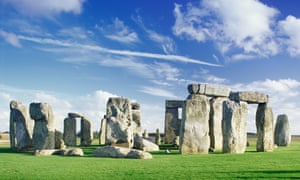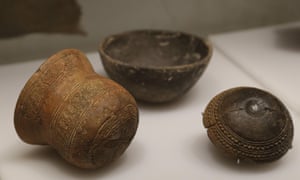The men and women who built Stonehenge left an indelible mark on the British landscape. However, researchers have discovered that their impact on other aspects of the nation may have been less impressive. In particular, their input into Britain’s gene pool appears to have fizzled out, having been terminated by light-skinned Bronze Age invaders who arrived just as Ancient Britons were midway through their great Stone Age project. In the end, these newcomers may have completely replaced the people who were building Stonehenge.
This startling conclusion is the result of a huge gene study of humans in prehistoric Europe. It shows that around 2500BC – when the main sections of Stonehenge were under construction – a race of people known to archaeologists as the Beaker folk arrived in Britain. Their genetic profiles were similar to individuals who were living in the Netherlands at the time. In just a short period, all genetic traces of early Stone Age Britons were replaced by those from these continental newcomers, although work on Stonehenge continued.
“It is very striking. There seems to have been a complete replacement of the original folk of Britain with these newcomers,” said Garrett Hellenthal, a statistical geneticist based at University College London. “Normally you get some older DNA surviving with a wave of immigrants, even a fairly large wave. But you don’t see that in this case. Frankly it looks more like an invasion.”
The arrival and spread of the Beaker folk is one of the most intriguing puzzles of European prehistory. These people made complex, very distinctive ornaments in silver and gold and constructed distinctive bell-shaped pots or beakers from which they get their name.
Around 4,500 years ago, this distinctive style of pottery suddenly appeared in the archaeological record and spread across Europe before arriving in Britain.
But what propelled this cultural transformation? Did Beaker pots spread because they were considered to be the hottest things in Bronze Age fashion? Or does the appearance of Beaker artefacts reflect a huge migration – or possibly invasion – of humans who brought their ornaments and tools with them? Was it the idea that expanded, or was it a tide of invaders or migrants that spread through Europe? Archaeologists have remained divided over the issue.
The recently published gene study – published on the website bioRxiv earlier this month – was designed to provide an answer, and in one respect at least it has succeeded. When it comes to Britain, the pots were definitely accompanied by the people who made them, in what may or may not have been a violent invasion.
The study was one of the largest ancient genome analyses ever undertaken. Led by Iñigo Olalde and David Reich of Harvard Medical School, it involved more than 100 scientists working at several dozen research centres in different countries and included analyses of more than a million pieces of DNA taken from remains found at burial sites of people who had lived across Europe between 4700BC and 1200BC. The results were startling.
“Essentially, two different patterns were discovered,” said archaeologist Marc Vander Linden, of University College London. In continental Europe, when Beaker artefacts appear in the archaeological record there is no change in the DNA profiles from the remains of people who lived then. There was no replacement. “In Europe, it was the pots – and other fashionable artefacts – that moved, not the people,” added Linden. In other words, Beaker artefacts spread across the continent as an idea or fashion, or cultural craze.
But there was an exception. In Britain, the arrival of Beaker pots and artefacts was very different. It coincided exactly with the disappearance of the genetic signatures of the Stone Age people who had been living there. This was replaced with DNA associated with a group of Beaker users who have been traced to a region in the modern Netherlands. In other words, Beaker artefacts appeared not as an exported fashion, but as items carried by waves of immigrants or by people carrying out an invasion. Once in Britain, these incomers, bearing Beaker items, replaced the Stone Age people who had been living there. Whether this was a violent takeover is unclear. No evidence of battles has ever been found.
Nevertheless this replacement is definitely surprising, Pontus Skoglund, a Harvard Medical School geneticist, says in this week’s Nature. It suggests the Stone Age farmers who were building Stonehenge were abruptly elbowed out by Beaker folk invaders. “The people who built Stonehenge probably did not contribute any ancestry to later people or, if they did, it was very little,” Skoglund states. However, Durham University archaeologist Ben Roberts sounded a note of caution. “There is no doubt that ancient DNA studies are redefining our prehistory, but this work is based on a fairly small sample.
“The conclusion that there was almost complete replacement of DNA at this time is pushing the data a bit too far. However, this has certainly triggered a renewed debate about the Beaker. We just need more data.”
This point was backed by Linden. “This apparent replacement is very striking, but it is possible our results are being skewed. In particular, the introduction of cremation at this time could have destroyed bones that would otherwise have provided DNA samples and which could change results. This is certainly not the end of the story.”






Geen opmerkingen:
Een reactie posten